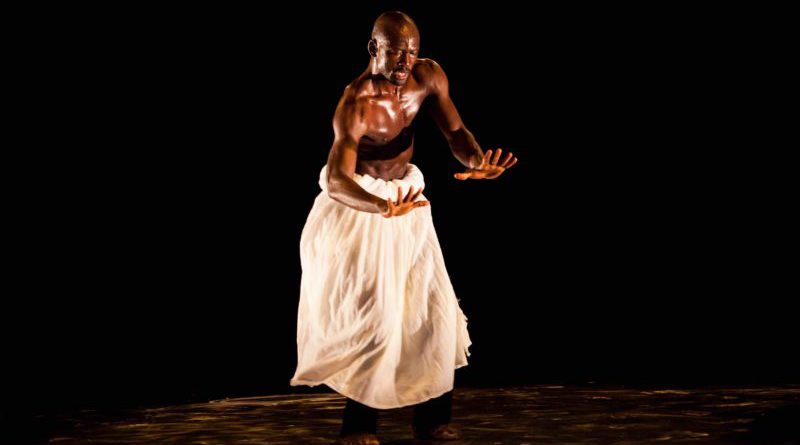INTERVIEW: New dance perspectives emerge at Harlem Stage
Photo: Lacina Coulibaly choreographs and stars in The Rite of Initiates. Photo courtesy of Harlem Stage / Provided with permission.
This weekend, Harlem Stage celebrates the choreographic contributions of several artists from Africa. Their successful E-Moves series brings some of the most creative minds together to offer dances inspired and influenced by a variety of cultures. Performances continue through May 5.
On the program are Nora Chipaumire, Lacina Coulibaly and Ousmane Wiles, each presenting a unique performance on the theme of being African in the United States.
Coulibaly’s contribution is called The Rite of Initiates, a piece that promotes the humanity and culture of Africa, according to press notes. Its Bambara language title is translated as “under our feet,” speaking to the heritage of Africa and how it is propelled forward.
Coulibaly did not only choreograph the work, but he also performs it with Ibrahim Zongo. Recently Hollywood Soapbox exchanged emails with Coulibaly about The Rite of Initiates. Questions and answers have been slightly edited for style.
What can audiences expect from The Rite of Initiates?
In this work I really want to arouse curiosity in people regarding the great diversity and immense cultural wealth in Africa. It is also a way of showing or exposing what is missing or not said in the media regarding African news in US. It is usually through art that people learn thing[s] regarding the value of Africa and the people who lived and live there. The Rite of Initiates is a rite of passage of my life to another, which is not my generation, and I hope that the audience will feel like they are with me in that journey.
What was the inspiration for the creation of this work?
My inspiration came from the rites, that state of being that it creates in oneself and how it can affect those who are watching. I still remember it like it was yesterday, the day I assisted a rite in Ouida in Benin, almost 20 years ago. Traditional dance form has created something powerful in me that I even don’t have words to describe it.
What has it been like working on this project?
Working on this work was like getting to know and appreciate more about my culture, the knowledge and its diversity. I have learnt more about Africa from my art than I did at school in Burkina Faso. Knowing all of that about my culture creates more pride and confidence regarding the way I would present and define myself as an artist from Burkina Faso in Africa.
Looking back at your work over the years, what are some of the common themes that you have focused on?
The common themes are exposing African culture despite colonization, imperialism and revolt in political situations and the exploitation of resources in Africa.
When did you first fall in love with dance?
I have been in love with dance since a long, long time ago, but I would say I really fell in love in 1998. That was the year I started to spend money travelling to another city in Burkina in order to learn different traditional dance forms. That year, I started to invest money and time in dance as a professional dancer.
What can audiences expect in the future?
I know that my next work will focus on the African leaders that we could not or did not protect, the African leaders that gave their life in order to make the situation in their countries better. It would send a message that we need to take the stand when it is needed to protect them.
I am also writing an essay, which is my pedagogical point of view, of what I consider the fundamentals in the study of African dance. I have named it Sigini in Bamaman, a spoken language in Mandé West Africa. Sigini from the words ‘Sigi’ means to root, inhabit, and ‘Ni’ means soul, defined as a way of dancing by inhabiting and embodying the movement with the soul. Sigini pulls out the kinesthetic form of African dance and the rhythmic structure that defines African dance technique.
By John Soltes / Publisher / John@HollywoodSoapbox.com
E-Moves plays Harlem Stage through May 5. Click here for more information and tickets.

